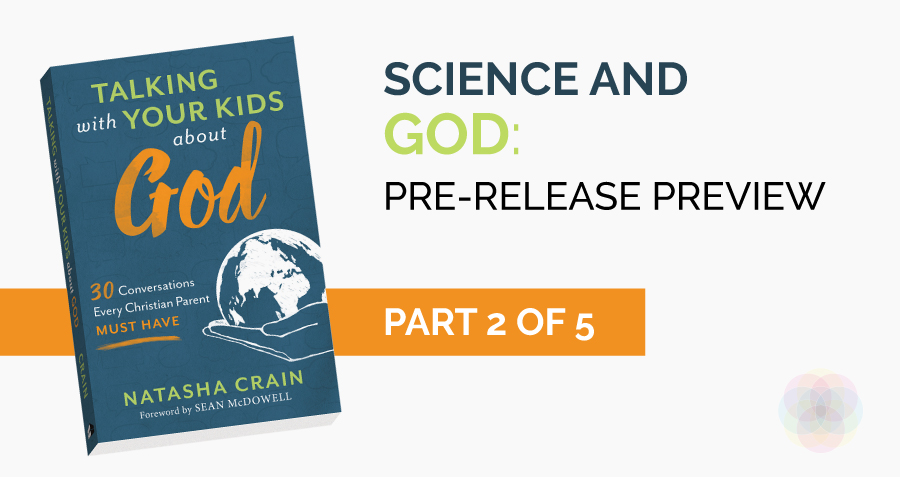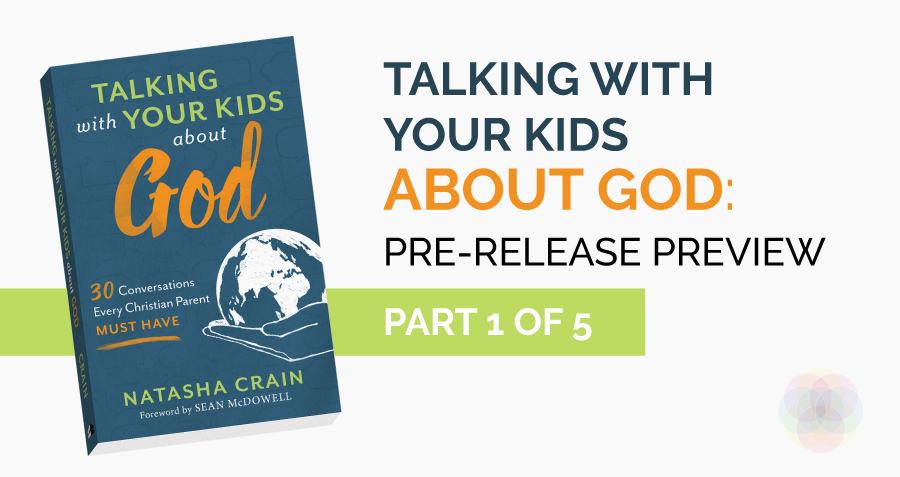Category: Biblical Difficulties
-

Science and God: Pre-release Preview Part 2
This summer, our church’s Sunday School program pulled together a curriculum for the K-5th grade students. They focused on God and science. Biologists, mathematicians, astronomers, nurses, and chemists from our church congregation presented lessons to the children each Sunday morning, accompanied by group experiments, worship songs, and more. The kids came alive with each presentation…
-

Talking with Your Kids about God: Pre-release Preview Part 1
Have you asked your kids “How do you know God exists?” lately? I’m not sure I’m brave enough to ask mine and share their answers here. I like to think my husband and I do a pretty good job of helping them think carefully about God… but we all know how kids have a way…
-

4 Faith Questions that Used to Make Us Sweat
There are some questions about the Christian faith that you’ve undoubtedly heard, wondered, and/or been asked. When the questions arose, it’s very likely that you either already had an answer, didn’t have an answer but felt confident you could find one, or were straight up stumped. All of us have been stumped at one time…
-

Book Review: Why Does God Allow Evil?
Friends, we recently finished reading Why Does God Allow Evil? by Dr. Clay Jones. It’s the fantastic culminating work of decades of teaching and research. Buy it. Read it. The end. I’m tempted to leave this as is and let that be the extent of our review. But, lest you still need convincing that this…
-

Is Jesus a Myth? “No” in 8 Links + 1
Is Jesus a myth? No. But that certainly doesn’t deter some people from claiming that he is. Thankfully, many theologians and apologists have responded to this assertion well. We’ve rounded up some great responses and videos that throttle and trash the claim that Jesus is not what Christians believe him to be.
-

Why Can’t We Be Friends? The Age of the Earth
There’s something that has been weighing on me, as I’m sure it has weighed on some of you. If it hasn’t, please bear with me and try to see where I’m coming from. Young Earth Creationism and Old Earth Creationism. There. I’ve said the terms in the same sentence and already many of you are…
-

Step out of Your Bubble: Investigate Belief
It’s easy to stay in your bubble. It’s cozy and familiar. Even on the occasion when one belief is causing friction with another, as long as no outside source shines light on the cognitive dissonance, we can keep on keeping on. But that’s not what we’re called to do. And it’s not really what we’re content with, is it?
-

Quick Thought: Can God Make a Rock so Big He Can’t Lift It?
This week marked the beginning of a new year of Sunday School classes at our church. Each year provides a fresh opportunity to help young minds think well and further their relationship with and understanding of God. I like to ask the incoming first graders for their biggest, hardest question about God. That gives us the…
-

Jesus: Begotten or Created? (for Kids & JWs)
This week, my Jehovah’s Witness friends are stopping by for a visit. It will be the first time my boys can understand the conversation, so I’ve started thinking of terms that should be clarified with them before the meeting (just in case). “Begotten” and “created” come to mind. When these Witnesses and I met to study “What Does…
-

Operation: Helping Children to Identify Heresy
Recently, I was playing the game Operation with one of my children. If you’ve never endured enjoyed this pastime, let me break it down for you. Players take turns using tweezers to pull out various afflictions, ranging from a bird in the brain to a frog in the throat, from your patient “Cavity Sam.” But, if you’re not careful,…
-

“Good Deeds” and “Nice” Aren’t Getting You to Heaven
You’ve probably heard this before: “People who are basically good and do their best will go to Heaven. I’m nice and I do more good things than bad things, so I’m going, too.” Now, before we dive into the reasons that this thinking is flawed and dangerous, let’s first see what the Bible says about…
-

Unicorns and the Bible
This short, informative video, created by Nathan Hoffman, addresses a commonly raised objection about the accuracy of the Bible: unicorns! We were fortunate enough to see this video shared on Facebook, and hope that it proves to be an interesting watch for you as well. Why does the Bible mention unicorns? Aren’t those things mythical?…

